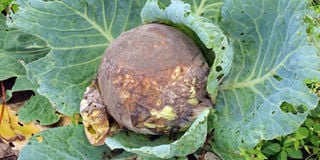Organic pesticides you can use for your garden

Grey mould disease can destroy a cabbage garden. Photo by Beatrice Nakibuuka
What you need to know:
- Sometimes the ants and termites attack the vegetables and Tusiime has resorted to planting marigold flowers within the garden to keep away some insects because they do not like the smell from the flowers, writes Beatrice Nakibuuka
Pests and diseases cause a great deal of economic loss to crop farmers. Besides reducing yields and lowering harvest quality, pests and diseases also increase production costs.
It would be cheaper for a farmer to prevent or take control measures with the readily available resources.
Worldwide, there is a decreasing market for farm products with a chemical content.
Many farmers are now going organic as a new trend that is likely to increase market for their products and probably at higher prices.
This ranges from the selection of good seeds, using natural fertilisers such as droppings and dung from poultry and livestock instead of the manufactured fertilisers.
Pesticides are one of the causes of water pollution, and some pesticides are persistent pollutants and contribute to soil contamination. There is a need therefore to use more environment friendly pesticides.
Vinegar
When it comes to spraying to protect plants from pests, some farmers do not use the manufactured pesticides but rather their homemade pesticides which they claim have been effective in controlling pests.
Christine Griffin Tusiime grows about 20 types of vegetables on a 25 decimal piece of land in Bukasa and she says they were being affected by plant flies. She got the idea of using vinegar and liquid soap in a mixture to kill the flies.
“My neighbour told me about this idea. I mix 10ml of vinegar, 10ml of liquid soap and one litre of water for the garden and this has helped me keep my garden organic and pest-free,” she says.
She taught her workers how to make the mixture and they are able to do it even when she is away. Sometimes the ants and termites attack the vegetables and Tusiime has resorted to planting marigold flowers within the garden to keep away some insects because they do not like the smell from the flowers.
Rabbit urine
It takes about four rabbits for a farmer to collect one litre of urine a day. Some farmers who keep many rabbits can have as much urine which they can sell. A 20- litre jerrycan of rabbit urine goes for Shs20,000 according to Julius Ayebale a rabbit farmer.
The rabbits are kept in wooden cages with wire mesh around them to allow proper ventilation.
Beneath the cages, Ayebale says, one can put sloping iron sheets projected into a gutter that enables collection of the urine needed.
These help to direct the urine into a basin at the catchment area where it is collected and kept in jerrycans.
The urine is left to ferment for three weeks and thereafter mixed with ash to control pests and diseases in passion fruit, groundnuts, maize, potatoes and vegetables.
Tobacco spray
Just as tobacco is hazardous to humans, it is harmful to the pests too. For a long time, Tusiime says tobacco spray has been used as a pesticide for killing caterpillars and aphids.
Mix a cup of organic tobacco into three litres of water. Allow the mixture to set overnight. After 24-hours, the mix should have a light brown colour. If it is very dark, add more water. This mix can be used on most plants, except those in the solanaceous family (tomatoes, peppers, eggplants and others.)
Neem tree leaves
Robert Otuba, a farmer in Budaka grows hibiscus which are normally affected by nematodes and glow worms.
He makes a mixture of cayenne pepper, neem tree leaves or aloe vera which he crashes, soaks in water then sieves them and puts the mixture in the pump then sprays each plant.
“I usually spray twice but only a week apart and these organic remedies are very effective in killing the root-knot nematode, bugs and the glow worms which usually affect the plants,” he says.
Human urine
A traditional practice in Uganda uses ash and urine to control pests and diseases. A description is provided on how the practice can be used in passion fruits, groundnuts, maize and potatoes.
Collect human urine, put it in a bucket and keep it covered under a shade for three days.
Add about 500 grammes of ash for every two litres of urine and keep the mixture covered for three more days. Shake the mixture well and use it to control aphids on passion fruit plants. Spray infected plant parts as soon as the pest is seen and repeat the application daily for two weeks.
To prevent ground nut blight, spray the mixture on groundnuts 14 days after germination and a second spray 28 days after the first spray. To prevent maize stalk borer attack, spray the maize four to six weeks after planting. Also use the mixture to prevent pest attack on potatoes and beans. For general prevention of pests, Ayebale recommends that you spray when expecting pest attack especially during the dry season.
“Wood ash and human urine perform just as well as the mineral fertilizers, while doing less damage to the environment. The combination is rich in nutrients, nitrogen, phosphorus, potassium, calcium and magnesium,” he says.




